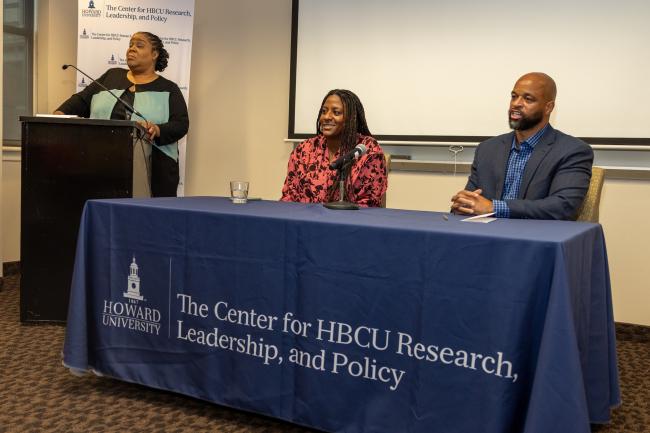By Pyper Harvey
The Center for HBCU Research, Leadership, and Policy at Howard University hosted its Inaugural Summer Invitational Conference, “HBCUs as Incubators of Research, Leadership, and Policy,” at the Kellogg Conference Center in Washington, D.C.
Established in 2021, the center seeks to serve as a generator and repository of research that examines issues of significance to HBCUs through collaboration, advocacy, and a shared commitment to ensuring the 22nd century success of these storied institutions.
Conference participants included invited faculty and academics, along with the center’s inaugural HBCU Center Fellows who presented their HBCU-focused research.
Award-winning author and distinguished professor, Jelani Favors, PhD, served as the keynote speaker. In reflecting on Favors’ speech, center fellow J. Elijah Bratton said, “That was the most profound, prolific, and riveting conversation with Dr. Jelani Favors. There were so many gems, so many rich pieces of this conversation, but I think what stands out to me is his statement, ‘…this analysis is great but what is it doing for Black liberation?’ That question shakes me at my core. As someone committed to Black liberation, to Black justice, to Black self-sufficiency, it is a question I don’t think I have ever heard a scholar put so bluntly and put so concisely.”
The timing of this year’s conference comes after the recent Supreme Court’s ruling to end affirmative action and subsequent outcries to support HBCUs with funding for capital improvements, research, and endowment support.
Melanie Carter, PhD, associate provost and director of the HBCU Center, emphasized the importance of empirically documenting the work and impact of HBCUs. “This conference sought to do that and to identify horizon issues that should inform our work.”
The conference also included a panel presentation on educational policy and politics. Panelists Denise Smith, deputy director and senior fellow of The Century Foundation, and Carlas McCauley, PhD, the associate dean for research and sponsored programs at Howard University’s School of Education, discussed their recent work. These included federal policies that will affect HBCUs and a project that focuses on the enrollment trajectory of students who graduate from Title I schools and attend HBCUs.
Conference participants were eager to learn how HBCU-centered research influences state and federal policy and schooling practices. Smith explained the importance of strategically developing and nurturing networks with policymakers and other advocacy and grassroots organizations.
McCauley also shared that legislators, state officials, and local educational administrators rely upon researchers for expert perspectives and opinions, encouraging those in attendance to make sure their research doesn’t remain on a shelf, but ensure it is put in the hands of those who make decisions in policy. “As HBCU researchers, we must view this as our responsibility,” McCauley said.
HBCU center fellow Brittani Williams shared her views on the fellowship program. “This experience has been phenomenal. I have been able to be in community with other scholars on HBCU critical issues across the nation and I have been able to learn more about the work here at Howard and just be in community with Dr. Ebonierose Wade and Dr. Melanie Carter,” Williams said. “They are brilliant Black women in this space and so it’s just been a nurturing experience for me and just a growth experience where I’ve been able to focus on research that I care about outside of my day-to-day doctorial research.”
The conference culminated with the HBCU fellows being presented with awards for their significant research contributions.
In her closing remarks, Carter thanked the Bill and Melinda Gates Foundation for its support of the HBCU Center Fellows program and congratulated the fellows on their impressive work. “As our inaugural cohort, we are pleased with what you’ve accomplished and are confident that this will be fertile soil on which more work will grow.”

